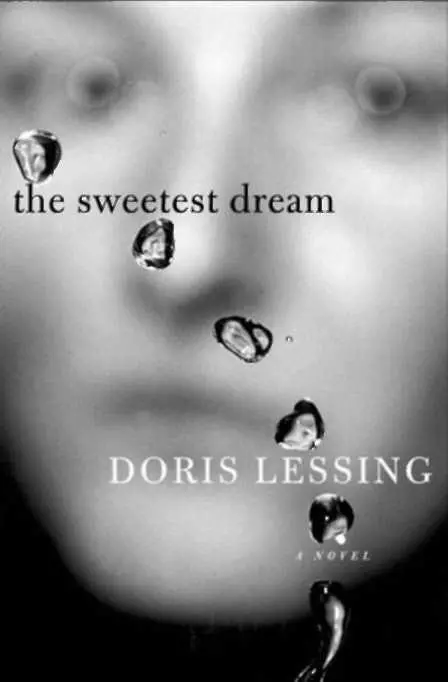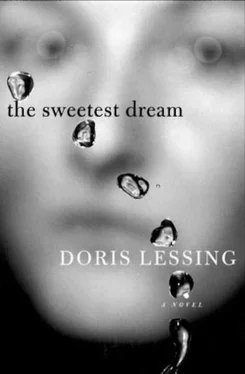Doris Lessing - The Sweetest Dream
Здесь есть возможность читать онлайн «Doris Lessing - The Sweetest Dream» весь текст электронной книги совершенно бесплатно (целиком полную версию без сокращений). В некоторых случаях можно слушать аудио, скачать через торрент в формате fb2 и присутствует краткое содержание. Год выпуска: 2001, ISBN: 2001, Издательство: perfectbound, Жанр: Современная проза, на английском языке. Описание произведения, (предисловие) а так же отзывы посетителей доступны на портале библиотеки ЛибКат.
- Название:The Sweetest Dream
- Автор:
- Издательство:perfectbound
- Жанр:
- Год:2001
- ISBN:0060937556
- Рейтинг книги:4 / 5. Голосов: 1
-
Избранное:Добавить в избранное
- Отзывы:
-
Ваша оценка:
- 80
- 1
- 2
- 3
- 4
- 5
The Sweetest Dream: краткое содержание, описание и аннотация
Предлагаем к чтению аннотацию, описание, краткое содержание или предисловие (зависит от того, что написал сам автор книги «The Sweetest Dream»). Если вы не нашли необходимую информацию о книге — напишите в комментариях, мы постараемся отыскать её.
The Sweetest Dream — читать онлайн бесплатно полную книгу (весь текст) целиком
Ниже представлен текст книги, разбитый по страницам. Система сохранения места последней прочитанной страницы, позволяет с удобством читать онлайн бесплатно книгу «The Sweetest Dream», без необходимости каждый раз заново искать на чём Вы остановились. Поставьте закладку, и сможете в любой момент перейти на страницу, на которой закончили чтение.
Интервал:
Закладка:

The Sweetest Dream
With gratitude to my editor at Flamingo, Philip Gwyn Jones, and to my agent Jonathan Clowes, for good advice and criticism, and to Antony Chennells, for help with the Roman Catholic parts of the book.
Author's Note
I am not writing volume three of my autobiography because of possible hurt to vulnerable people. Which does not mean I have novelised autobiography. There are no parallels here to actual people, except for one, a very minor character. I hope I have managed to recapture the spirit of, particularly, the Sixties, that contradictory time which, looking back and comparing it with what came later, seems surprisingly innocent. There was little of the nastiness of the Seventies, or the cold greed of the Eighties.
Some events described as taking place at the end of the Seventies and early Eighties in fact happened later, by a decade. The Campaign for Nuclear Disarmament took a stand against the government doing anything at all to protect the population against the results of nuclear attack or accident, even fall-out, though surely protection of its citizens should be any government's first responsibility. People who believed that the population should be protected were treated as if they were enemies, attacked with verbal abuse, fascists being the least of it, and sometimes physically. Death threats... unpleasant substances pushed through letterboxes – the whole gamut of mob abuse. There has never been a more hysterical, noisy and irrational campaign. Students of the dynamics of mass movements will find it all in the newspaper archives, and I have had letters from them on the lines of, 'But that was crazy. Just what was it all about?'
What Has Been, Can Be Again
Upon Receiving the 2001 Prince of Asturias Prize in Literature in Madrid
Once upon a time, and it seems a long time ago, there was a respected figure, the Educated Person. He — it was usually he, but then increasingly often she — was educated in a way that differed little from country to country — I am of course talking about Europe — but was different from what we know now. William Hazlitt, our great essayist, went to a school, in the late eighteenth century, whose curriculum was four times more comprehensive than that of a comparable school now, a mix of the bases of language, law, art, religion, mathematics. It was taken for granted that this already dense and deep education was only one aspect of development, for the pupils were expected to read, and they did.
This kind of education, the humanist education is vanishing. Increasingly governments — our British government among them — encourage citizens to acquire vocational skills, while education as a development of the whole person is not seen as useful to the modern society.
The older education would have had Greek and Latin literature and history, and the Bible, as a foundation for everything else. He — or she — read the classics of their own countries, perhaps one or two from Asia, and the best known writers of other European countries: Goethe, Shakespeare, Cervantes, the great Russians, Rousseau. An educated person from Argentina would meet a similar person from Spain, one from St. Petersburg meet his counterpart in Norway, a traveler from France spend time with one from Britain, and they would understand each other: they shared a culture, could refer to the same books, plays, poems, pictures, in a web of reference and information that was like a shared history of the best the human mind has thought, said, written.
This has gone.
Greek and Latin are disappearing. In many countries the Bible, and religion — going. A girl I know, taken to Paris to broaden her mind, which needed it, though she was doing brilliantly in examinations, revealed that she had never heard of Catholics and Protestants, knew nothing of the history of Christianity or any other religion. She was taken to hear mass in Notre Dame, told that this ceremony had been a basis of European culture for centuries, and she should at least know about it — and she dutifully sat through it, rather as she might a tea ceremony in Japan, and afterwards enquired,"Are these people some kind of cannibal then?" So much for what seems enduring.
There is a new kind of educated person, who may be at school and university for twenty, twenty-five years, who knows everything about a specialty (computers, the law, economics, politics) but knows about nothing else — no literature, art, history — and may be heard enquiring, "But what was the Renaissance, then?" "What was the French Revolution?"
Even fifty years ago this person would have been seen as a barbarian. To have acquired an education with nothing of the old humanist background — impossi-ble.To call oneself educated without a background of reading — impossible.
Reading, books, the literary culture, was respected, desired, for centuries. Reading was and still is in what we call the Third World, a kind of parallel education, which once everyone had, or aspired to. Nuns and monks in their convents and monasteries, aristocrats at their meals, women at their looms and their sewing, were read to, and the poor people, even if all they had was a Bible, respected those who read. In Britain until quite recently trade unions and workers' movements fought for libraries, and perhaps the best example of the pervasiveness of the love for reading is that of the workers in the tobacco and cigar factories of Cuba whose trade unions demanded that the workers should be read to as they worked. The material was agreed to by the workers, and included politics and history, novels and poetry. A favorite of their books was The Count of Monte Christo.A group of workers wrote to Dumas and asked if they might use the name of his hero for one of their cigars.
Perhaps there is no need to labor this point to anyone present here, but I do feel we have not yet grasped that we are living in a fast fragmenting culture. Pockets of the old excellences remain, in a university, a school, the classroom of an old-fashioned teacher in love with books, perhaps a newspaper or a journal. But a culture that once united Europe and its overseas offshoots has gone.
We may get some idea of the speed with which cultures may change by looking at how languages change. English as spoken in America or the West Indies is not the English of England. Spanish is not the same in Argentina and in Spain. The Portuguese of Brazil is not the Portuguese of Portugal. Italian, Spanish, French, grew out of Latin not in thousands of years but in hundreds. It is a very short time since the Roman world disappeared, leaving behind its legacy of our languages.
One interesting little irony about the present situation is that a lot of the criticism of the old culture was in the name of Elitism, but what is happening is that everywhere are enclaves, pockets, of the old kind of reader and reading and it is easy to imagine one of the new barbarians walking by chance into a library of the old kind, in all its richness and variety and understanding suddenly what has been lost, what he — or she — has been deprived of.
So what is going to happen next in this tumultuously changing world? I think we are all of us fastening our seat belts and holding on tight.
I drafted what I have just read before the events of the 11th September.We are in for a war, it seems, a long one, which by its nature cannot have an easy end.We all know that enemies exchange more than gunfire and insults. In this country, Spain, you know this better perhaps than anyone. When feeling gloomy about the world I often think about that time here, in Spain, in the early Middle Ages — in Cordova, in Toledo, in Granada, in other southern cities — Christians, Moslems, Jews, lived harmoniously together: poets, musicians, writers, sages, all together, admiring each other, helping each other. It went on for three centuries. This wonderful culture went on for three centuries. Has anything like it been seen in the world? What has been, can be again.
Читать дальшеИнтервал:
Закладка:
Похожие книги на «The Sweetest Dream»
Представляем Вашему вниманию похожие книги на «The Sweetest Dream» списком для выбора. Мы отобрали схожую по названию и смыслу литературу в надежде предоставить читателям больше вариантов отыскать новые, интересные, ещё непрочитанные произведения.
Обсуждение, отзывы о книге «The Sweetest Dream» и просто собственные мнения читателей. Оставьте ваши комментарии, напишите, что Вы думаете о произведении, его смысле или главных героях. Укажите что конкретно понравилось, а что нет, и почему Вы так считаете.












